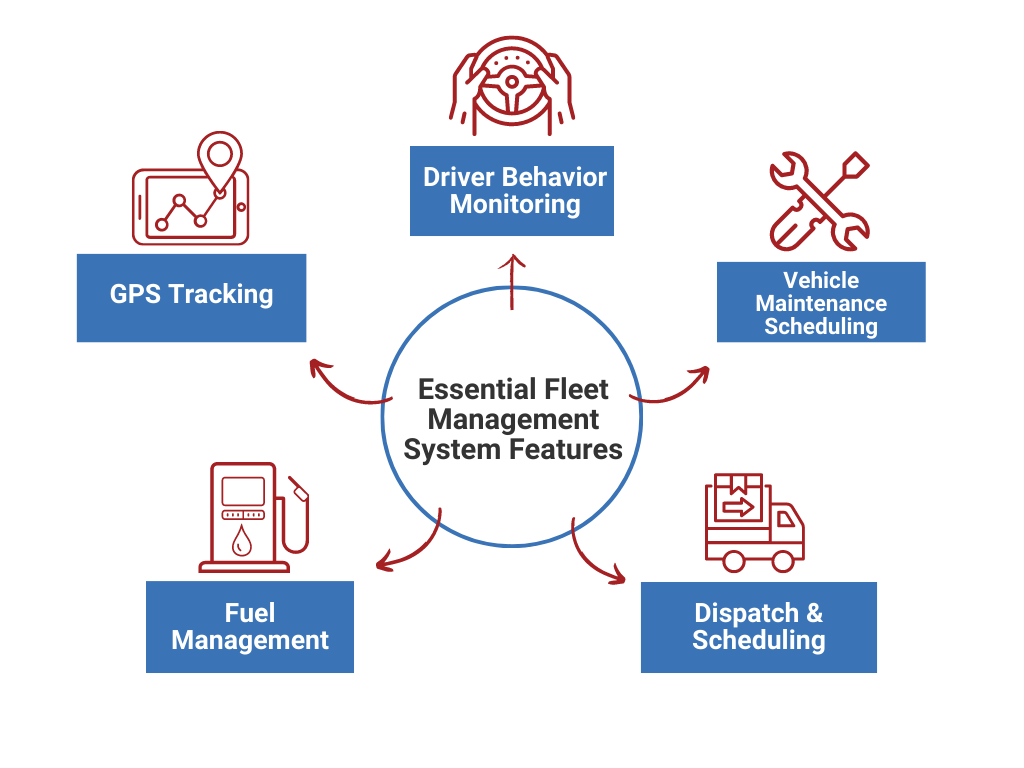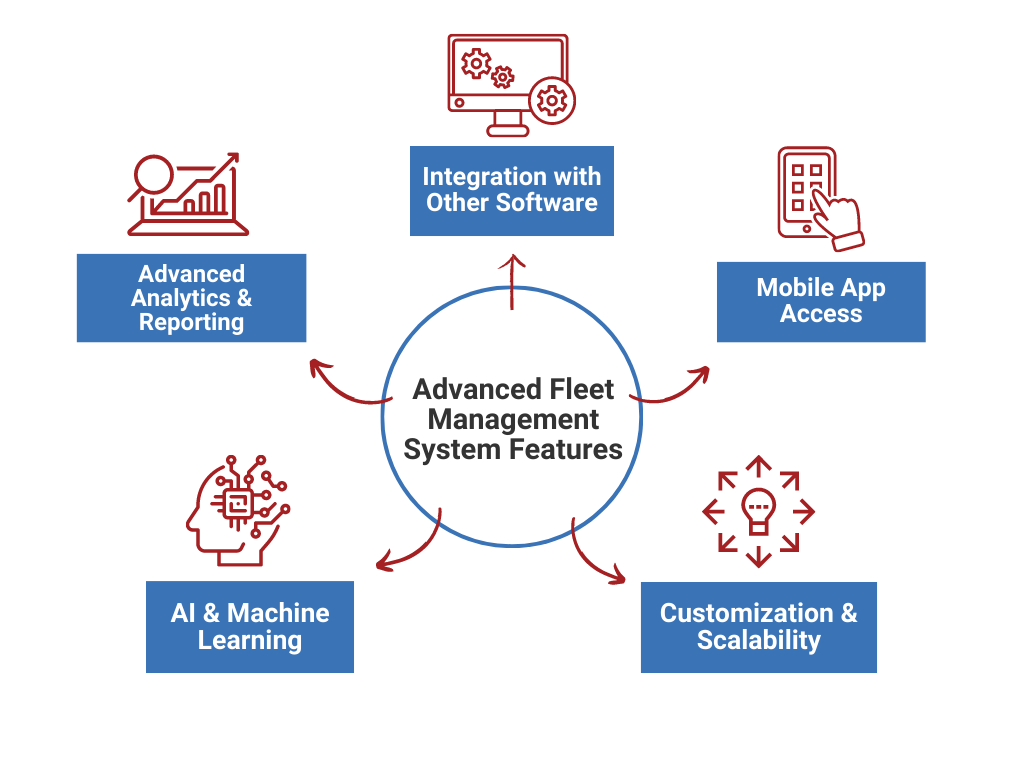Top Features to Look for in Fleet Management Software
Fleet management is a complex and ever-evolving field, with a vast range of industries relying on fleets of vehicles to transport goods and provide services. Whether you're managing a delivery fleet, a service fleet, or a mix of both, having the right tools in place is essential to ensure your operations run smoothly and efficiently. This is where a fleet management system comes in.
So, what exactly is a fleet management system? Simply put, it's a software solution that enables fleet managers to monitor, track, and optimize their vehicles and drivers in real-time. With the right features, a fleet management system can help you streamline your operations, reduce costs, and improve safety and compliance.
But not all fleet management systems are created equal. To truly unlock the full potential of your fleet, it's essential to have the right features in place. From GPS tracking and driver behavior monitoring to vehicle maintenance scheduling, fuel management, and dispatch and scheduling, the essential features of a fleet management system are many and varied.
In this blog, we will dive into the essential features that every fleet management system should have and explore the advanced features that can take your fleet management to the next level. By the end of this blog, you should have a comprehensive understanding of the features needed to optimize your fleet management operations and take your business to the next level.
Essential Fleet Management System Features
 When it comes to fleet management, the key to success is having the right tools for the job. And at the heart of any effective fleet management strategy is a robust fleet management system. With the right system in place, fleet managers can monitor and optimize their vehicles and drivers in real-time, ensuring that their operations run smoothly and efficiently.
When it comes to fleet management, the key to success is having the right tools for the job. And at the heart of any effective fleet management strategy is a robust fleet management system. With the right system in place, fleet managers can monitor and optimize their vehicles and drivers in real-time, ensuring that their operations run smoothly and efficiently.
So, what are the essential features of a fleet management system? Let's take a closer look:
GPS Tracking
With GPS tracking, fleet managers can keep tabs on the location of their vehicles in real-time. This not only helps them optimize their routes and schedules, but it also enables them to respond quickly to any issues that arise on the road.
Driver Behavior Monitoring
Good drivers are the backbone of any successful fleet operation. With driver behavior monitoring, fleet managers can track a range of metrics, from speeding and harsh braking to fuel efficiency and idle time. This helps them identify areas where their drivers can improve and provides valuable data for coaching and training.
Vehicle Maintenance Scheduling
Regular maintenance is essential for keeping your vehicles on the road and minimizing downtime. With vehicle maintenance scheduling, fleet managers can stay on top of routine maintenance tasks, such as oil changes and tire rotations, and receive alerts when a vehicle is due for service.
Fuel Management
Fuel is one of the biggest expenses for any fleet operation. With a fuel management feature, fleet managers can track fuel usage and identify areas where they can reduce costs. This includes everything from monitoring idling time to optimizing routes to minimize fuel consumption.
Dispatch and Scheduling
Effective dispatch and scheduling are essential for keeping your fleet running smoothly. With the right fleet management system in place, fleet managers can quickly assign drivers to new jobs, monitor progress in real-time, and adjust schedules on the fly to ensure that everything stays on track.
Advanced Fleet Management System Features

In our previous section, we explored the essential features of a fleet management system that every fleet manager should have. But what if you want to take your fleet management to the next level? That’s where advanced features come in. With the advanced features we will explore below, you can unlock a whole new level of efficiency and insight into your fleet operations.
Advanced Analytics and Reporting
With advanced analytics and reporting, fleet managers can dig deeper into the data of their fleet and gain a more comprehensive understanding of their operations. This includes everything from tracking vehicle performance metrics to analyzing driver behavior patterns to identifying areas where costs can be reduced.
Integration With Other Software
A fleet management system doesn't operate in a vacuum. By integrating with other software solutions, such as ERP systems, dispatch software, or telematics devices, fleet managers can gain a more holistic view of their operations and make better-informed decisions.
Mobile App Access
The ability to access fleet data on the go is essential for fleet managers who are constantly on the move. With a mobile app, you can monitor your fleet from anywhere, at any time, and receive alerts and notifications in real-time.
Customization and Scalability
Every fleet operation is unique, and the best fleet management systems should be customizable and scalable to meet the specific needs of each organization. This means that fleet managers can tailor their system to fit their operations, adding or removing features as needed and scaling up or down as their business evolves.
Artificial Intelligence and Machine Learning
As technology continues to advance, artificial intelligence (AI) and machine learning (ML) are becoming increasingly important in fleet management. By leveraging AI and ML algorithms, fleet managers can automate many routine tasks, such as vehicle maintenance scheduling or route optimization, and gain valuable insights into their operations that would be difficult to obtain manually.
With these advanced features in place, fleet managers can unlock a whole new level of efficiency, insight, and control over their operations. Whether you're just starting out or looking to take your fleet management to the next level, investing in the right fleet management system can pay dividends for years to come.
Evaluating Fleet Management System Features
Investing in a fleet management system can be a game-changer for your business, but with so many different options on the market, it can be challenging to know where to start. How do you know which features are essential, which are nice to have, and which are just simply unnecessary?
The key is to start by identifying the specific needs of your fleet. What are your goals? What challenges are you facing? What metrics are you tracking, and what data do you need to collect to make informed decisions? By answering these questions, you can begin to narrow down your options and focus on the features that matter most to your operation.
Once you have a clear idea of your needs, it's time to start assessing the features offered by different fleet management system vendors. This can be a daunting task, but there are a few key factors to keep in mind. First, make sure that the system is easy to use and intuitive. No matter how powerful the features may be, if the system is too complicated, your team will struggle to adopt it.
Next, consider the level of customization and scalability offered by the system. Can you add or remove features as your business evolves? Can you tailor the system to fit the specific needs of your operation? These are important considerations, as you don't want to be stuck with a system that doesn't grow with your business.
Finally, evaluate the return on investment (ROI) and long-term benefits of each system. How much will the system cost, and how quickly can you expect to see a return on your investment? What are the long-term benefits, such as increased efficiency, reduced costs, and improved safety?
By carefully evaluating each system based on these criteria, you can make an informed decision that will benefit your business for years to come. Remember, investing in the right fleet management system is not just a short-term expense; it's an investment in the future of your business.
Choosing the Best Fleet Management System Features for Your Business
Choosing the best fleet management system features is a critical decision that can have a significant impact on the success of your fleet operations. As we've seen, there are a multitude of features available, and it can be overwhelming to determine which ones are right for your organization.
Investing in the right fleet management system can bring numerous benefits, including increased efficiency, reduced costs, and improved safety. It's not just about choosing any system, but selecting one that aligns with your business goals and helps you achieve them.
To select the best features for your organization, always start by identifying your specific needs, challenges, and goals. Then, research the available features and functionalities to see which ones can address those specific areas. Don't forget to also consider factors such as user-friendliness, scalability, and compatibility with your existing systems.
It's also important to involve your team in the decision-making process, including drivers and other stakeholders who will be using the system on a daily basis. This can help ensure buy-in and adoption of the new system, which is crucial for its success.
By taking the time to choose the best fleet management system features, you can position your business for success in the competitive fleet industry. It's an investment worth making, and one that can pay dividends for years to come.
Take the leap, do the research, and choose the right system for your fleet's unique needs. Your business will thank you for it.